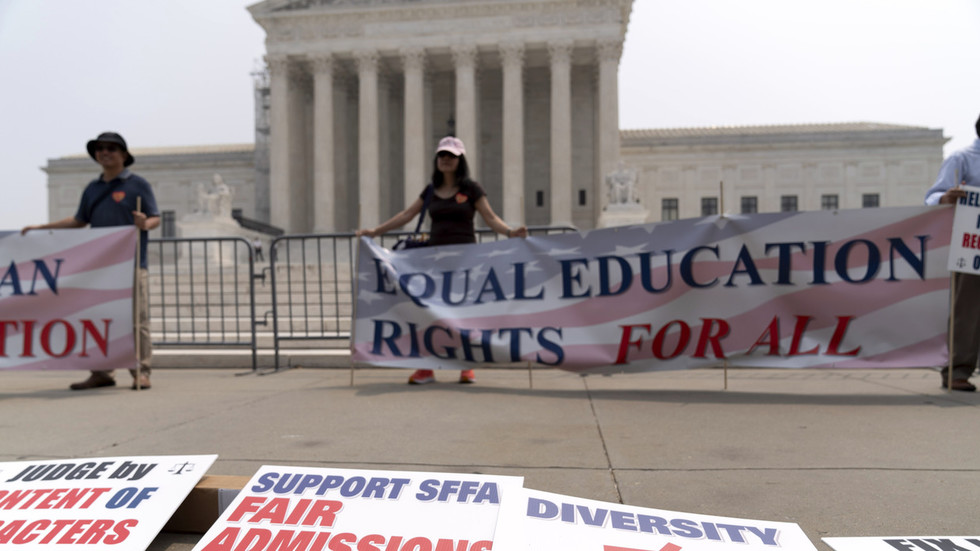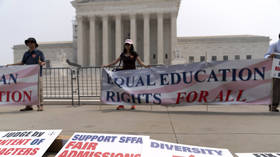
Harvard and the University of North Carolina were sued for favoring black students over whites and Asians

People protest against affirmative action outside of the Supreme Court in Washington DC, June 29, 2023 © AP / Jose Luis Magana
The US Supreme Court has ruled that colleges and universities can no longer take race into consideration when choosing who to admit. The decision overturns a system that critics say has unfairly penalized whites and Asians for almost four decades.
The court delivered its verdict on Thursday, with its six conservative justices ruling against affirmative action and its three liberals dissenting. Writing the court’s majority opinion, Justice John Roberts – considered a moderate and a “swing” justice – argued that race-based admissions policies violate the US Constitution’s Equal Protection Clause.
Such policies “lack sufficiently focused and measurable objectives warranting the use of race, unavoidably employ race in a negative manner, involve racial stereotyping, and lack meaningful end points,” Roberts wrote.
Justice Clarence Thomas was more forceful, slamming universities for their “rudderless, race-based preferences designed to ensure a particular racial mix in the entering classes.”
These policies “fly in the face of our colorblind Constitution and our nation’s equality ideal,” Thomas declared.

Read more
The case, which was brought before the court by a conservative activist group, specifically concerned admissions policies at Harvard and the University of North Carolina. According to evidence cited in the ruling, Harvard considers a prospective student’s race at each step along its three-step admission process, while UNC assigns “plus” points to students from certain minority groups.
The end result is that a black applicant scoring in the bottom 30-40% on Harvard’s admissions test has a higher chance of acceptance than an Asian student scoring in the top 10%. At UNC, 77% of black applicants scoring between 70% and 80% on their admissions tests are admitted, compared to 48% of white applicants and 34% of Asian applicants.
Justice Sonia Sotomayor led the dissenting liberal justices. The US, she wrote, is an “endemically segregated society where race has always mattered and continues to matter.” By denying black students an advantage over their white or Asian peers, Sotomayor claimed that the court’s ruling “rolls back decades of precedent and momentous progress.”
Unlike other American institutions, colleges and universities have been officially permitted to sort applicants by race since 1978. Despite persistent criticism that the policy amounts to “reverse racism,” the Supreme Court upheld affirmative action in 2003.
Thursday’s ruling does allow colleges to consider an applicant’s “discussion of how race affected his or her life” in entrance assignments, Roberts wrote. However, he added that the applicant “must be treated based on his or her experiences as an individual – not on the basis of race.”




